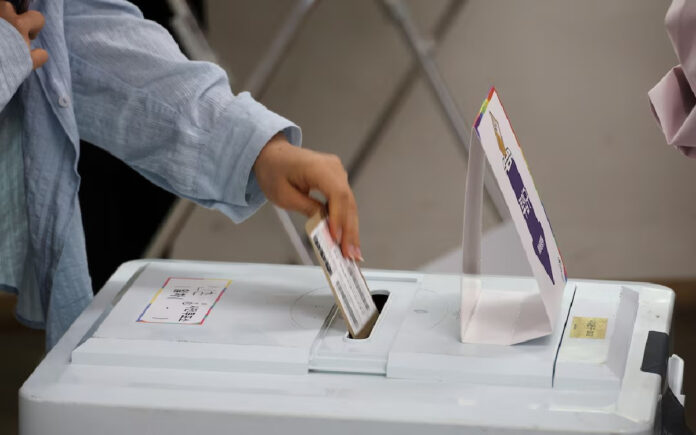Seoul/London/Germany: A deepening political gender divide among Generation Z is reshaping the democratic landscape in several countries, with South Korea emerging as a key battleground in the upcoming June 3 presidential elections. Young women there are expected to drive a significant political backlash against the ruling conservative party, while their male counterparts appear set to support right-wing alternatives, highlighting a growing generational schism.
This divide is not unique to South Korea. Across major democracies in North America, Europe, and Asia, political alignment among Gen Z voters is splitting along gender lines. While young women are increasingly rallying behind progressive and left-leaning parties, a notable segment of young men is gravitating toward right-wing populism, expressing discontent over societal shifts they perceive as marginalizing their traditional roles.
In South Korea, first-time voter Lee Jeong-min illustrates this trend. He plans to support the Reform Party’s candidate, Lee Jun-seok, who has pledged to dismantle the country’s Ministry of Gender Equality. The issue of mandatory military service for men is central to Lee’s frustration.
“As a young man, I find this to be one of the most unfair realities of living in Korea. At the prime of their youth — at 21 or 22 years old — young men, unlike their female peers, are unable to fully engage in various activities in society because they have to serve 18 months in the military.”
According to a recent Gallup Korea poll, nearly 30% of South Korean men aged 18–29 support the Reform Party, compared with just 3% of women in the same age group. While more than half of the men back conservative platforms, nearly half of the women support the liberal Democratic Party. Among older generations, however, the divide narrows.
Dr. Soohyun Lee, a political economist at King’s College London, points to rising disillusionment among young men unable to meet societal expectations—stable employment, marriage, and home ownership. With limited immigration in South Korea, “women become the convenient scapegoat,” she explained, reflecting how feminism is often blamed for male socioeconomic setbacks.
A Broader Global Phenomenon
This generational gender rift is echoed in France, where young men in last year’s legislative elections leaned toward Marine Le Pen’s far-right party, while women were less likely to follow suit. Similarly, in the United Kingdom, young men are more inclined to vote Conservative than young women, with government data indicating higher unemployment or educational inactivity rates among men aged 16–24.
In Germany’s February general election, the anti-immigrant Alternative for Germany (AfD) party saw record support, particularly among men aged 18–24, 27% of whom backed the party. In contrast, 35% of women in the same age group voted for the far-left Linke party.
“A lot of young men are falling for right-wing propaganda because they’re upset, they have the feeling they’re losing power,” said 18-year-old Berliner Molly Lynch, a Linke supporter.
“But it’s actually losing power over women that wasn’t actually equal in the first place.”
While the gender divide is most stark among Gen Z, its roots stretch into millennial cohorts as well. In Canada’s recent elections, men aged 35–54 heavily favored the Conservative opposition, even as female voters rallied behind the Liberals in response to economic tensions exacerbated by U.S. trade policies.
Darrell Bricker, CEO of Ipsos Public Affairs, noted a shift among men with life experience who feel left behind. Nik Nanos, of Nanos Research, added that social media has accelerated this “angry young men” phenomenon, particularly in regions facing industrial decline.
Also Read | White House Prepares to Send DOGE Spending Cuts Package to Congress
In the U.S. and Beyond
The political gender gap was stark in the 2024 U.S. presidential race, where Donald Trump’s appeal to young white and Hispanic men—centered on economic nationalism and anti-diversity rhetoric—stood in contrast to widespread support for opponent Kamala Harris among young women. Exit polls showed nearly 50% of men aged 18–29 voted for Trump, while 61% of young women backed Harris. Young Black voters overwhelmingly supported Harris across genders.
In contrast, Australia’s recent elections saw less polarization among young voters. Analysts suggest that compulsory voting may help suppress radical swings and ideological extremes.
“It tends to iron out extreme ideas, ideologies,” noted political scientist Intifar Chowdury of the Australian National University.
Also Read | US Imposes New Export Restrictions on Chip Design Software and Materials to China
The Long-Term Implications
Experts warn that without addressing underlying causes such as job insecurity, housing affordability, and male mental health—particularly suicide rates—the Gen Z gender divide could intensify. Dr. Lee of King’s College cautions that the growing chasm may impede necessary national reforms.
“If the future generation is ever so divided along the lines of gender and then refuses to engage with each other to build social consensus, I do not think we can successfully tackle these huge issues,” she said.
As the world watches the political awakening of Generation Z, the question remains whether democracies can bridge the divide—or whether this gendered fault line will define politics for years to come.



